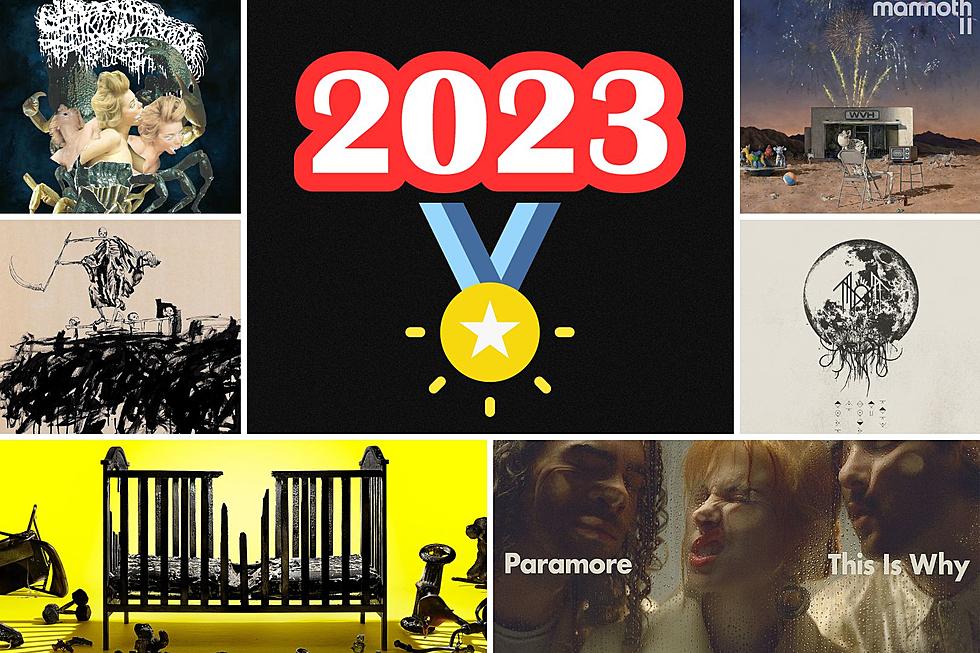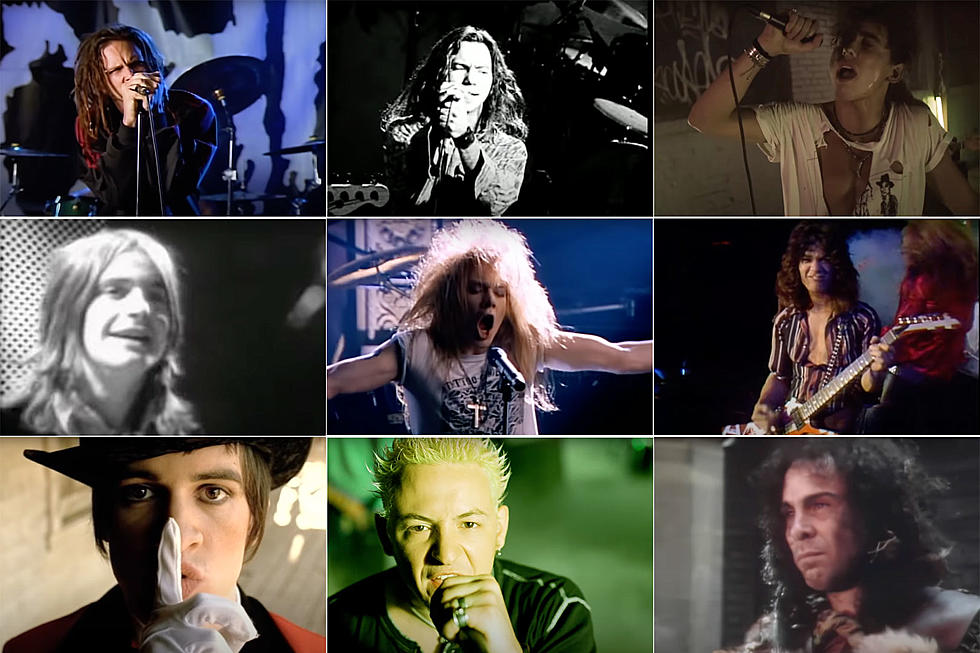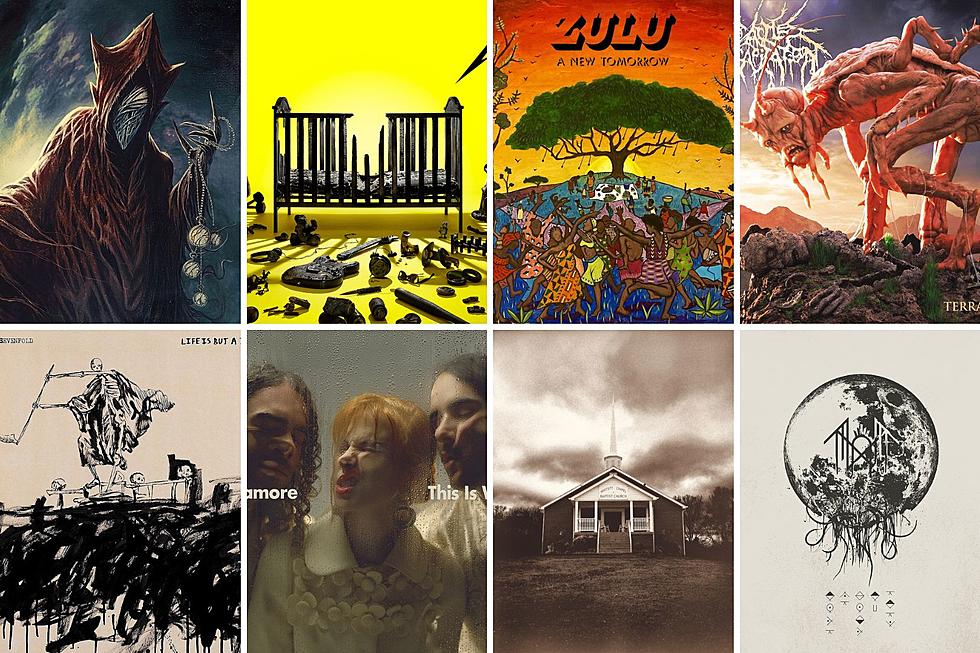
Periphery’s Misha Mansoor on ‘Juggernaut’ Albums, Analog vs. Digital, Self Image + More
Periphery's highly anticipated 'Juggernaut: Alpha' and 'Juggernaut: Omega' albums have just been released. The band really took its sound and technical skill to new realms in the 2015 records, and we spoke to Periphery guitarist Misha Mansoor about the whole shebang.
In this exclusive interview, Mansoor speaks about the various elements Periphery harnessed to give 'Juggernaut' its distinct character, the ongoing argument between analog vs. digital, Mansoors personal (and somewhat harsh) views of himself as a guitarist and much more.
Check out our chat with Periphery's Misha Mansoor below!
I've been listening to the 'Juggernaut' albums and I definitely think it's a step forward for you guys. What do the 'Juggernaut' albums include that hasn't been heard on previous Periphery releases?
That's something I'd have to think about sort of retroactively, because we weren’t really necessarily trying to do anything different -- or not do anything different. I'd say the approach was what was really unique. We knew that for the concept we wanted to do something that was cinematic; almost theatrical and epic and really dark. I think that's the kind of stuff that may be exploring new territory for us. I'd say it’s a lot darker, a lot of the material is a lot darker than the stuff we’ve done before; it’s a new vibe.
When you say "darker," do you mean lyrically or instrumentally?
I'd say both, definitely both. But instrumentally is what we wanted to do as well, given that we knew the story was going to be a dark one and we wanted that to be reflected by the music. Maybe, in a sense, at times more stripped down than some of the stuff that we’ve done in the past.
It seems 'Juggernaut' isn't necessarily a double album, just kind of two albums worth of material in one conceptual chunk.
Right.
What is the album's concept exactly?
Well, that I can’t talk about, because our singer Spencer doesn’t want us to put it out just yet. The reason is, we want people to be able to hear this album objectively; going into it blind and being able to make their own interpretation for the first time. The lyrics are there, and knowing the concept already, it seems really obvious to me, but I'm not entirely sure how people who don’t know in advance will interpret them. I think that will be really interesting for the rest of the band to see. Eventually, we will reveal what the actual concept is, but we just don’t want to start out with that, if that makes sense.
Totally. I think that's one of the best things about music. Even if someone comes up with their own entire idea of what they're listening to, that's still awesome because it evolves in all these different directions.
I also feel like it might influence the way people might take certain things in if they already know the concept before they listen to it, you know? It gives some context, or forces some context, on stuff that might not have otherwise.
Yeah, the imagination is going to go far with this one.
Hopefully, yeah.
The intention is to have fans listen to the album, preferably consecutively front-to-back in one big chunk. What do you think fans will get out of that and do you think they're going to miss important parts if they don't go for the long haul?
Part of the reason that we did do the two separate albums is because it is a long haul. Even as we were writing it and everything, we were like, "Man, this is a lot of material." I think it makes it a lot more digestible that we had two separate albums. I think it's fine if people digest one and then get into the other. I don't think anything will necessarily get missed, but we made it so people can have a choice, you know? They don’t have to get both and be overwhelmed, because that can work against you just as much. Sometimes if something’s overwhelming, they just kind of write it off.
I think people who like to listen to long albums can listen the whole way through and enjoy it, but people who don’t will listen to one, preferably the first one, and then when they eventually get into the second one, I think they’ll be rewarded with all sorts of themes and motifs and all these different links between the story. It is essentially just the second half of the story. I think it will be rewarding in both ways and that’s why we put it out the way we did.
Do you think that your fans are predisposed to listening to a very large amount of material in one sitting? Not just because of the stuff you've put out in the past, but sort of the niche that you guys fall into with progressive metal.
Yeah, I think at least our hardcore fans; the ones that are into prog music are definitely more open to an album. It's what we like, as opposed to a handful of songs. Some of my favorite albums are the kind that are really rewarding to listen to from front to back. We've always shaped our albums to be like that. We might have gotten those fans who are into those kinds of albums as well. But, at the same time, I recognize younger fans are ones who aren't as hardcore about it -- probably don't have the same appreciation for that that some of us do, you know? That's fine as well. Hopefully this operates on a song by song level too.
I think three dynamics are really huge in both records: Dissonance, ambience and heaviness.
Very cool, man.
Who are your biggest influences in creating the right kind of dissonance?
You know what's funny, man? You're not the first person to ask about that. I've never gotten so many questions about dissonance on a release. I guess we never really thought about how we were using the dissonance, it's just sort of used as a tool. I can't really cite any examples because it's not anything that I'm thinking of other than a way to make a certain vibe come out in a song, especially because we know what the concept is and we know what kind of vibe we're aiming for and it's kind of a way to make things unnerving; a way to introduce some discomfort. The trick to dissonance is to do it in a tasteful way, and that's maybe a little bit of the challenge because if you just go nuts with it, just like any tool, you can use it or abuse it. We try our very best not to abuse it, but I can't really site any sort of influences for the dissonance itself.
How about ambience? Because that's such a gigantic part of the 'Juggernaut' stuff.
For that kind of stuff, I'm very influenced by -- as strange as it may seem -- video game music.
Nice!
Movies, and things that really have to set an ambience. A big part of it was that we wanted this to be really cinematic. That goes hand in hand with that, we wanted there to be a definite vibe to certain parts and to the album in general. It was a dark, cinematic vibe and I think a lot of our video game and movie influences probably came through.
Heaviness: where are your influences in that department?
That's the clearer stuff, where you get bands like Meshuggah, Dream Theater, Deftones and lot of our peers, even. The heavy stuff is the stuff that comes a bit more naturally to us, it's stuff we don't have to think about as much. I'd say that the ambience is definitely the part that we put a lot of work into, the part that was very specific, because it was something we haven't really focused on before. That was something that everyone had to be on the same page about, sometimes it wasn't quite the ambience that fit the story. There are a lot of songs that were written that, in the end, we didn't end up using, just because the vibe was wrong.
Periphery are really taking metal into a digital age. A lot of people, when they talk about analog recording, they talk about the warmth of it. I think it's interesting the way digital stuff has progressed, because it's almost like digital has been able to almost replicate that warmth. Do you feel digital is getting into that territory?
I think it's been there for a long time. I think a lot of it is psychological tricks that your mind plays on you. If you look at these things objectively without any biases, in blind tests people have no idea which one is which. Unless they have the information, then they hear the warmth. This is describing the subjective with abstract terms, so you're falling into two traps there. What's warm to someone is dark to someone else. But the positive to someone is a negative to someone. You have all this cognitive dissonance with all this kind of stuff; confirmation bias.
You hear what you want to hear. If you want to like something, you'll find reasons to like it. If you want to dislike something you'll find reasons to dislike it. That's why I always say just trust your ears. Who cares what's going into them. I've had software plugins that cost very little money, at least in the context of a mix, sound fantastic. People think it's an amp. If I told them it was an amp, they'd be like, "Yeah, wow, that's a really nice amp. What is that?". I've done these kind of experiments with people before, throwing them off just to see what they say. It's more in how you use it. You can make modelers sound terrible. You can also make a tube amp sound terrible if you don't know what you're doing. I think it's in the application.
You're a very accomplished guitarist, and I think a lot of people really appreciate that about you and Periphery. In your mind, is there anybody who you look at and think, "No matter how good I get, there's no way I'll be as good as this person?"
Yeah, everybody dude. I don't consider myself a good guitarist at all.
Really?!
I'm kind of in a rut right. I'm kind of bummed out right now because I'm not where I want to be -- more so than usual. I think it's the eternal battle. I know I'll never be happy with my skills as a guitarist, but I also know its what keeps me working harder and trying. It's frustrating, but it's also inspiring when I see guitarists that just blow me away. My go-to top three are: Guthrie Govan, John Petrucci and Allan Holdsworth. There are so many other players, I couldn't even list all the guitar players I think just blow me out of the water and I will never be anywhere near their level. That's kind of depressing at first, but it's also kind of relieving. I don't need to be at that level. I just need to be better, that's all that matters.
I don't think there's any shame in being worse than John Petrucci.
[Laughs] Yeah, a lot of people are. I'm not playing guitar to prove anything to anyone. The main reason I want to get better at this instrument is just so that I can express myself easier and so I can get what's in my head out through my fingers in an easier fashion and play the stuff that I write cleaner so it makes it easier live and makes it easier in the studio as well. Those are the only reasons I really care about it, not so I can say I'm better or show off or this or that. That I have no interest in. I want to get better for myself, and I'll do that at my own pace and in my own way. I also know I'll never be satisfied but I'm going to try, nonetheless.
Thanks to Misha Mansoor for the taking time to speak with us. To grab both 'Juggernaut: Alpha' and 'Juggernaut: Omega,' head over to iTunes.
More From Loudwire









